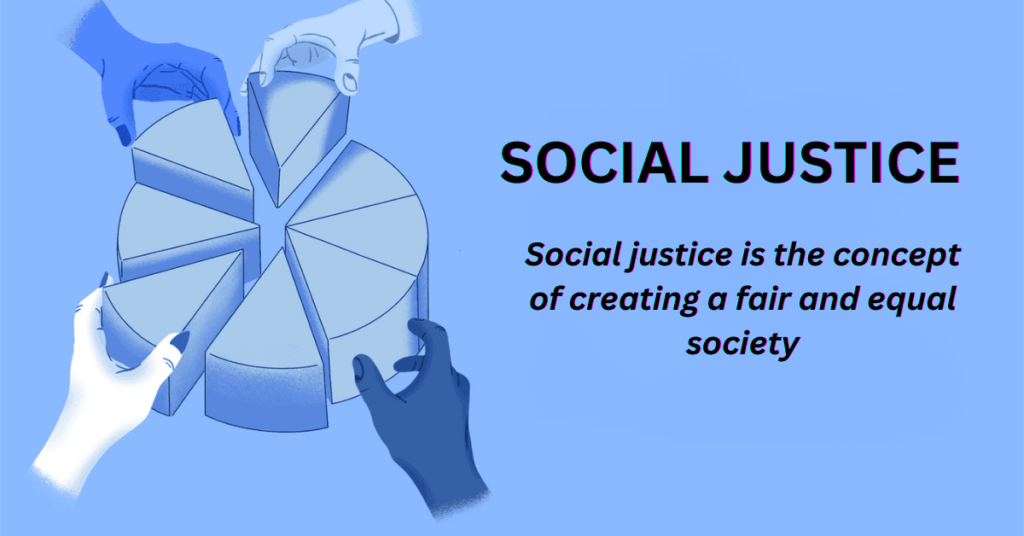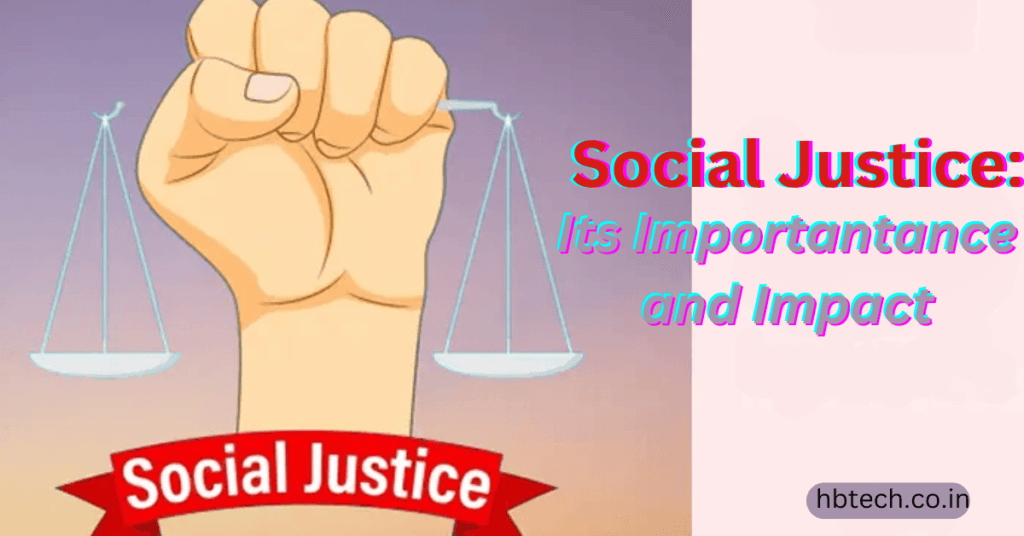Social justice is the idea that everyone in society should have equal rights, opportunities. and access to resources, regardless of their background. It ’s about creating fairness, where individuals are treated with respect and dignity. In this article, we’ll explore what social justice means, provide examples and discuss how it impacts society. We’ll also touch on its relevance for UPSC preparation and key issues in achieving social justice.

Defination of Social Justice
At its core, social justice is about fairness and equality in society. It focuses on ensuring that everyone has the same opportunities to succeed, regardless of factors like race, gender or economic status. The key principles of social justice include
- Equality: Everyone should have equal access to resources and opportunities.
- Equity: Addressing the needs of disadvantaged groups to bring them up to the same level as others.
- Rights: Protecting the fundamental rights of every individual, including their right to education, healthcare and freedom from discrimination.
- Participation: Encouraging everyone to be involved in decision-making and policy creation, especially marginalized communities.
Social Justice Examples
Social justice can be seen in many areas of life. Here are a few examples-
- Equal Pay for Equal Work: This principle ensures that men and women receive the same pay for doing the same job. It’s a key issue in achieving gender equality in the workplace.
- Affirmative Action: In many countries, policies have been introduced to help underprivileged groups by providing better access to education and job opportunities. For example in India, affirmative action supports communities like Dalits and Tribals .
- Environmental Justice: Often, marginalized communities suffer the most from environmental damage. Social justice in this context ensures that everyone , especially vulnerable groups, has access to a clean and healthy environment.
- Access to Education: Ensuring that all children, regardless of their background, have access to quality education is a critical part of social justice.
Social Justice PDF
If you ‘re interested in learning more about social justice, there are plenty of resources available in PDF format. You can find detailed guides, research papers. and case studies that cover the topic from various angles. These documents are often available on educational websites, government portals, and social justice organizations’ websites, offering free access to anyone who wants to dive deeper into the subject.
Social Justice in Society
Social justice is essential for a healthy and thriving society. It ’s about more than addressing past wrongs; it’s about creating systems where fairness is part of everyday life. In a society focused on social justice, everyone can expect:
- Fair Opportunities: Everyone has an equal chance to succeed in education, employment. and personal growth.
- Social Security: Governments provide safety nets to protect vulnerable groups through welfare programs.
- Access to Health and Education: Ensuring that essential services are available to everyone, particularly those from disadvantaged backgrounds.
A society that values social justice tends to be more stable, with fewer conflicts and more community support. It also helps reduce poverty, crime , and inequality.
Social Justice in UPSC
For UPSC aspirants, understanding social justice is important. as it is covered in the General Studies Paper II (Governance, Constitution, Polity , Social Justice, and International Relations) and the Essay paper. Here are some areas to focus on;
- Constitutional Provisions: The Indian Constitution is a strong advocate for social justice through measures like affirmative action for backward classes and the Right to Education.
- Government Schemes: Several programs, such as the National Rural Employment Guarantee Act (MGNREGA) and the Pradhan Mantri Awas Yojana (PMAY), aim to promote social welfare.
- Challenges in Social Justice: Issues like caste-based discrimination, gender inequality, and the lack of basic services such as healthcare and education continue to pose challenges.
Social Justice Issues
Despite many advancements, social justice issues still exist. Some of the major problems include;
- Caste Discrimination: In countries like India , the caste system still affects people’s access to education, employment, and social status.
- Gender Inequality: Women often face discrimination in areas like wages, education, and personal safety. Gender-based violence remains a serious issue worldwide.
- Racial Inequality: Many societies still struggle with racial discrimination, which affects access to education, jobs. and even basic rights.
- Economic Inequality: Poverty continues to affect millions of people globally, making it difficult for them to access essential services like healthcare, clean water, and education.
Social Justice Essay
Writing an essay on social justice can help explore its concepts in more detail. In such an essay, it’s important to:
- Define what social justice means.
- Explain its principles and how they apply in real life.
- Provide examples of how social justice is promoted or hindered in different societies.
- Discuss the role of governments, NGOs , and individuals in improving social justice.
- Suggest potential solutions for the challenges that marginalized communities face.
Social justice is key to creating a fair and equal society. It ’s about ensuring that everyone has the same opportunities to live a fulfilling life, regardless of their background. While there has been progress, many challenges remain. Whether you’re preparing for the UPSC exam, writing an essay, or just learning about the topic, understanding social justice is crucial for anyone who wants to contribute to a more equal and just world.
Frequently Asked Questions(FAQs)
What is social justice?
Social justice refers to the idea of creating a society where all individuals have equal access to rights, opportunities, and resources, regardless of their race, gender, ethnicity, or socioeconomic background. It focuses on fairness and equity, ensuring that everyone has the opportunity to succeed.
What are some examples of social justice?
Examples of social justice include:
Equal Pay for Equal Work: Ensuring men and women receive the same pay for the same job.
Affirmative Action: Policies that support historically disadvantaged groups by offering better educational and job opportunities.
Environmental Justice: Ensuring that marginalized communities, often the most affected by environmental issues, have access to a clean and healthy environment.
Access to Education: Providing all children with equal access to quality education.Where can I find resources on social justice in PDF format?
You can find PDFs on social justice on educational websites, government portals, and non-profit organizations’ sites. These resources may include case studies, research papers, and detailed guides on various aspects of social justice.
How does social justice impact society?
Social justice plays a vital role in promoting a fair and equal society. It helps reduce poverty, inequality, and discrimination, fostering greater social cohesion. By ensuring equal access to opportunities in areas like education, healthcare, and employment, social justice creates a more stable and prosperous society.
Why is social justice important for UPSC preparation?
Social justice is an important topic in the UPSC exam, especially in General Studies Paper II (Governance, Constitution, Polity, Social Justice, and International Relations). It is essential for understanding constitutional provisions related to equality, government policies, and social welfare programs. UPSC aspirants must also be aware of the challenges to social justice in India, such as caste-based discrimination and gender inequality.
What are the major issues related to social justice?
Key social justice issues include:
Caste Discrimination: The ongoing challenges faced by marginalized communities due to caste-based inequalities.
Gender Inequality: The discrimination women face in areas like pay, education, and personal safety.
Racial Injustice: Discrimination based on race or ethnicity, affecting access to opportunities and rights.
Economic Inequality: The persistence of poverty, limiting access to basic services such as healthcare and education.









